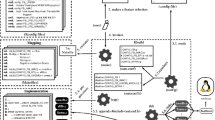Abstract
In the lifecycle of a software product line (SPL), incremental generalization is usually required to extend the variability of existing core assets to support the new or changed application requirements. In addition, the generalization should conform to the evolved SPL requirements which are usually represented by a feature model. In this paper, we propose a feature-driven and incremental variability generalization method based on the aspect-oriented variability implementation techniques. It addresses a set of basic scenarios where program-level JBoss-AOP based reference implementations respond to the feature-level variability generalization patterns. It also provides the corresponding guidance to compose these patterns in more complex cases. Based on the method, we present a case study and related discussions.
Preview
Unable to display preview. Download preview PDF.
Similar content being viewed by others
References
Clements, P., Northrop, L.: Software Product Lines: Practices and Patterns. Addison-Wesley, Reading (2002)
Krueger, C.: Eliminating the Adoption Barrier. IEEE Software 19, 29–31 (2002)
Alves, V., Gheyi, R., Massoni, T.: Refactoring Product Lines. In: Proceedings of the 5th International Conference on Generative Programming and Component Engineering (GPCE 2006), pp. 201–210 (2006)
Thum, T., Batory, D., Kastner, C.: Reasoning about Edits to Feature Models. In: Proceedings of the 31th International Conference on Software Engineering, ICSE 2009 (2009)
Kang, K.C., Cohen, S., Hess, J., Nowak, W., Peterson, S.: Feature-oriented domain analysis (FODA) feasibility study. Technical Report CMU/SEI-90-TR-21, Software Engineering Institute. Carnegie Mellon University, Pittsburgh, PA (1990)
Kang, D.C., Kim, S., Lee, J., Kim, K., Kim, G.J., Shin, E.: FORM: A feature-oriented reuse method with domain-specific architecture. Annals of Software Engineering 5, 143–168 (1998)
Kiczales, G., Lamping, J., Mendhekar, A., Maeda, C., Lopes, C., Loingtier, J.M., Irwin, J.: Aspect-Oriented Programming. In: Aksit, M., Matsuoka, S. (eds.) ECOOP 1997. LNCS, vol. 1241, pp. 220–242. Springer, Heidelberg (1997)
Filman, R., Friedman, D.: Aspect-oriented programming is quantification and Obliviousness. In: Proceedings of the Workshop on Advanced Separation of Concerns, in conjunction with OOPSLA 2000 (2000)
Khan, K.: JBoss-AOP (2008), http://www.jboss.org/jbossaop/
Pawlak, R., Seinturier, L., Retaille, J.: Foundations of AOP for J2EE Development. Apress (2005)
Kiczales, G., Hilsdale, E., Hugunin, J., Kersten, M., Palm, J., Griswold, W.: Getting Started with AspectJ. Communications of the ACM 44, 59–65 (2001)
Batory, D.: Feature models, grammars, and propositional formulas. In: Obbink, H., Pohl, K. (eds.) SPLC 2005. LNCS, vol. 3714, pp. 7–20. Springer, Heidelberg (2005)
Alves, V., Matos, P., Cole, L., Borba, P., Ramalho, G.: Extracting and evolving mobile games product lines. In: Obbink, H., Pohl, K. (eds.) SPLC 2005. LNCS, vol. 3714, pp. 70–81. Springer, Heidelberg (2005)
Liu, J., Batory, D., Lengauer, C.: Feature Oriented Refactoring of Legacy Applications. In: Proceedings of the 28th International Conference on Software Engineering (ICSE 2006), pp. 112–121 (2006)
Trujillo, S., Batory, D., Diaz, O.: Feature Refactoring a Multi-Representation Program into a Product Line. In: Proceedings of the 5th International Conference on Generative Programming and Component Engineering (GPCE 2006), pp. 191–200 (2006)
Peng, X., Shen, L.W., Zhao, W.Y.: Feature Implementation Modeling based Product Derivation in Software Product Line. In: Mei, H. (ed.) ICSR 2008. LNCS, vol. 5030, pp. 142–153. Springer, Heidelberg (2008)
Peng, X., Zhao, W.Y., Xue, Y.J., Wu, Y.J.: Ontology-Based Feature Modeling and Application-Oriented Tailoring. In: Proceedings of the 8th International Conference on Software Reuse (ICSR 2006), pp. 87–100 (2006)
Author information
Authors and Affiliations
Editor information
Editors and Affiliations
Rights and permissions
Copyright information
© 2009 Springer-Verlag Berlin Heidelberg
About this paper
Cite this paper
Shen, L., Peng, X., Zhao, W. (2009). Feature-Driven and Incremental Variability Generalization in Software Product Line. In: Edwards, S.H., Kulczycki, G. (eds) Formal Foundations of Reuse and Domain Engineering. ICSR 2009. Lecture Notes in Computer Science, vol 5791. Springer, Berlin, Heidelberg. https://doi.org/10.1007/978-3-642-04211-9_17
Download citation
DOI: https://doi.org/10.1007/978-3-642-04211-9_17
Publisher Name: Springer, Berlin, Heidelberg
Print ISBN: 978-3-642-04210-2
Online ISBN: 978-3-642-04211-9
eBook Packages: Computer ScienceComputer Science (R0)




